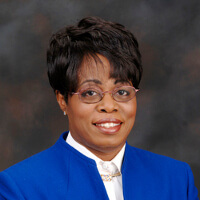WANDA AUSTIN

"The Human Factor: Managing Technical Complexity and Creativity in the 21st Century"
September 25, 2008
The second Rechtin Lecture will be delivered by Dr. Wanda Austin, CEO of The Aerospace Corporation.
Dr. Wanda M. Austin succeeded Dr. William F. Ballhaus Jr. as president and chief executive officer of The Aerospace Corporation upon his retirement on January 1, 2008.Austin served previously as the senior vice president of The Aerospace Corporation's National Systems Group in Chantilly, Va. She has been with the company since 1979 and has served in positions of increasing responsibility, including general manager of the MILSATCOM (Military Satellite Communications) Division and senior vice president of the Engineering and Technology Group.
Austin earned a Bachelor of Arts degree in mathematics from Franklin and Marshall College, Masters of Science degrees in both mathematics and systems engineering from the University of Pittsburgh, and a PhD in Industrial and Systems Engineering from the University of Southern California in 1988 (Dissertation: "A Framework for an Intelligent Simulation Environment for System Dynamics Modeling.") She is a member of the NASA Advisory Council and is a fellow of the AIAA (American Institute of Aeronautics and Astronautics).
Austin has received numerous awards and citations. Among them are the Air Force Scroll of Achievement, the National Reconnaissance Office Gold Medal, the U.S. Air Force Meritorious Civilian Service Medal, the Air Force Space and Missile Systems Center's Martin Luther King Spirit of the Dream Award, the Society of Women Engineers Upward Mobility Award, and the Women in Aerospace Outstanding Achievement Award.
The Aerospace Corporation is an independent, nonprofit company that provides objective technical analyses and assessments for national security space programs and selected civil and commercial space programs in the national interest. Prof. Eberhardt Rechtin served as CEO of The Aerospace Corporation for 10 years, beginning in 1977, joining USC in 1987.
ABSTRACT
Dr. Austin will open her address by celebrating Dr. Rechtin’s legacy, saluting his accomplishments and reaffirming his relevance for current and aspiring systems engineers. She will then turn to one of the areas that most concerned Dr. Rechtin: attracting the best and brightest minds to the aerospace industry and helping them grow and develop into the finest systems engineers in the world.
As Dr. Rechtin once wrote, the aerospace business truly flourishes when it is populated by “creative individuals capable of understanding and resolving problems of almost overwhelming complexity.” The human capital issue that Dr. Rechtin grappled with – making sure that the right people and processes were aligned – is more critical than ever today as aerospace companies attempt to build workforces that can meet the myriad challenges of the 21st century.
The lecture will next focus on the needs, attitudes and world-view of Generation Y, the major supplier of tomorrow’s systems engineers. As Dr. Austin will explain, Gen Y is – in many ways – the embodiment of Dr. Rechtin’s thoughtful and authentic professional vision and values. Indeed, these young people have the imagination and integrity that are prerequisites for systems engineering innovation today. Moving to a more pragmatic plane, Dr. Austin will continue her talk by offering a five-point plan that’s designed to help up-and-coming systems engineers get the knowledge, insights and intelligence they need to take their place in the aerospace industry of the near-future. Without this learning, it will be difficult for new hires to eventually transition from specialties to domain-related areas like airborne systems integration, and then on to end-to-end systems engineering.
Dr. Austin will conclude by discussing Dr. Rechtin’s love of space, as well as his respect for its power and potential. Like Dr. Rechtin, Dr. Austin believes that space gives all of us a much-needed sense of connectedness; it reinforces the fact that we are part of something larger than ourselves. And, as systems engineers, we have an obligation to help explore the skies responsibly and for the betterment of mankind.
Published on March 27th, 2017
Last updated on December 16th, 2019

